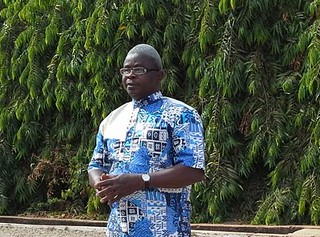RISING voices: Mahama Saaka, Social Scientist (UDS, Ghana)
Mahama Saaka, is a scientist from the University for Development Studies (UDS) in Ghana. The university (UDS) is one of the Africa RISING implementing partner institutions. In this interview which is part of a series of portraits of key people in Africa RISING, Dr Mahama introduces himself and his work within the Africa RISING program.

Tell us about your background?
I was born in Ga, a community located in the Upper West Region of Ghana. I grew up in that Region right from infancy until the age of sixteen when I had to proceed for my secondary and higher education elsewhere.
Right from the Secondary School I had the innate interest in nutrition and food related professions. This arose from my naive belief that working in such professions will allow one not to be deprived of one’s food. I was the eldest child of my parents and occasionally I had to cook for my siblings any time my parents were away in the farm. I also had an earlier exposure to farming activities because my father was a peasant farmer. All these might have generated interest in my chosen profession.
By design, my first degree at the University of Ghana was in the area of Food and Nutrition. At the master’s level at the University of Sheffield, England I pursued Human Nutrition. Then my PhD studies was in Public Health Nutrition at Edith Cowan University in Australia. I have since then also acquired a second Master of Medical Science degree in Human Nutrition (MMedSci).
What do you do in your current position? (in relation to the Africa RISING project)
My initial contact with Africa RISING came when a colleague in the Ghana Health Service approached me to assist in conducting an IITA sponsored baseline survey on nutrition in northern Ghana. Through that assignment, I got the opportunity in 2014 to lead the “Improving household nutrition through agricultural and behavioral change communication” research component of IITA project activities in northern Ghana.
What are your plans for Africa RISING?
My priority focus is to carry out a community intervention trial that tests the hypothesis that combined focused behaviour change communication (BCC) with nutrition sensitive agricultural interventions will better improve the production and consumption of nutrient-dense foods (e.g., dark green leafy vegetables, legumes, and animal source foods) thereby reversing the high rates of chronic malnutrition in five districts of northern Ghana.
The project takes a multi-sector approach to promoting agriculture, food and nutrition security and is implemented jointly by the University for Development Studies (UDS), Ministry of Food and Agricultural Development (MoFA) and the Ghana Health Service (GHS).
What are the biggest Africa RISING challenges and how do you propose we deal with them?
The challenge to me is figuring out how much of the Africa RISING farming technologies and innovations have been adopted and what is the empirical evidence of such adoption. Ensuring seamless integration within the project is the other challenge I see. Certain activities appear not to be very well integrated hence limiting the opportunity of a holistic approach to solving particular problems. I think that there is room for more improvements in this regard. I also think that we should also start reporting on more and more outcome and impact indicators e.g. increased agricultural revenues of the poorest households, Feed the Future nutrition indicators, adoption rates of the new practices etc.
What in your opinion are some of the main achievements of this program?
Africa RISING activities has so far been able to reach out to rural farm families with improved farming innovations and technologies that seek to enhance productivity in a sustainable manner.
The programme has also collaborated with universities and research institutions to produce graduates who are needed for development in the society. This is a laudable achievement that should be maintained and enhanced.
What gives you hope looking at a possible second phase, based on the first phase?
The central focus of Africa RISING will continue to be relevant in the next two decades because of the serious threat of climatic changes on food production and environmental degradation. Climate change has become the most serious environmental threat to the fight against hunger, malnutrition, disease and poverty in Africa because of its impact on agricultural productivity. So therefore, any measure or strategy that can help prevent or reduce this threat cannot be underestimated.
The world has long recognized the important role of research in the linkages between agriculture and nutritional well being. For this reason Africa RISING has a great opportunity in the future to expand on-going activities and initiate new ones too in this direction.




